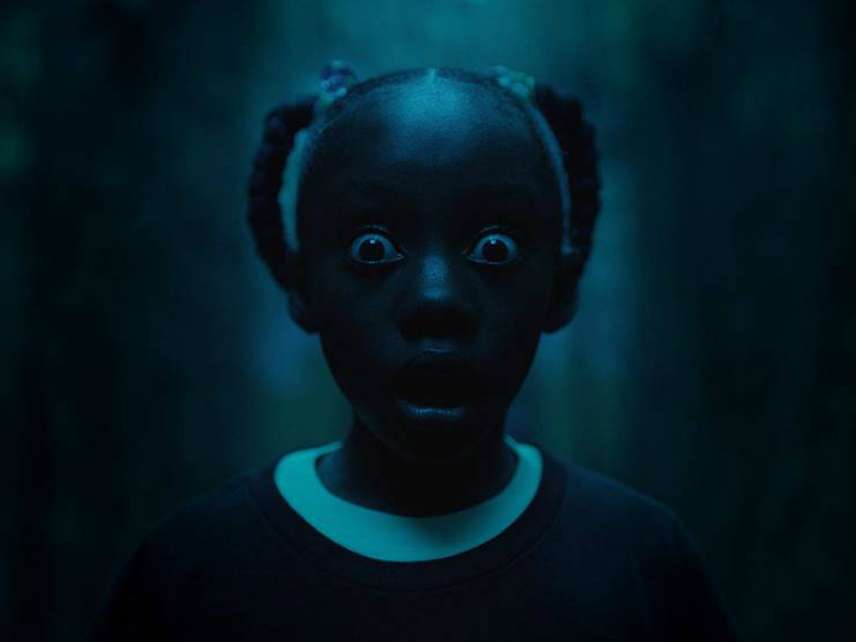Movie Review: Us
Jordan Peele would like you to be very afraid. You won't let him down.

Jordan Peele's Us is a very scary movie that doesn't add up, which is too bad. Peele's uber-nerd cinephilia—the clever echoes of such horror-canon treasures as Don Siegel's Invasion of the Body Snatchers, Stanley Kubrick's The Shining, George Romero's Day of the Dead, Michael Haneke's Funny Games, and on and on—is non-stop fun ("Isn't that the Lost Boys boardwalk?"). But then there are elements that feel as if they should be significant, yet in the end don't signify anything (what's with all the rabbits?). As a writer, Peele has more ideas than he can fit into one picture, and even his great gifts as a director—his skills in the areas of shot design, lighting and scoring, and his empathy for actors—can't stanch the conceptual overflow.
Fortunately, the movie is, as noted above, very scary. And so even the untethered elements of the story can, for those in a generous mood, pass as puzzle pieces in the Lynchian manner, floating free in the movie's dark tide of dread.
The picture is a showcase for Lupita Nyong'o, who stars as the obscurely haunted middle-class mom Adelaide Wilson. Adelaide seems firmly rooted in the world with her big lovable husband Gabe (Nyong'o's Black Panther costar Winston Duke) and their two kids, Zora (the tartly appealing Shahadi Wright Joseph) and her little brother Jason (Evan Alex). In the movie's kickoff scene, set in a seaside amusement park in 1986 (cue the Thriller t-shirts), we watch as little Adelaide wanders away from her parents to a sinister-looking funhouse advertising an opportunity to "Find Yourself." Which is exactly what she does find: a doppelganger, a duplicate of herself—although this version is decidedly creepier.
Years later—now, that is—Adelaide and her family are back in that beach town (it's Santa Cruz, California), where they have a summer home. Peele does a nice job of establishing the family's domestic interactions, which are both prickly and affectionate in a real-life way. Then the horrors start. One night another family turns up – another mom and dad and two kids. We first see them standing silently, eerily in the shadows at the top of the Wilsons' driveway. They're all wearing rust-red boiler suits, and the father figure has a leather golfing glove on one hand. Gabe goes out to see what the deal is with these people—and things go very wrong very quickly.
This spectral family unit is a ghastly reflection of the Wilsons, or maybe something even more. ("It's us," says little Jason.) The mother (Nyong'o again—all the lead actors play their doppelgangers as well) has a rasping voice (she sounds as if she's just begun trying it out) and a demented expression, but she also exudes a yearning melancholy. The father is a hulking mute who communicates only in grunts, and the children—a teen girl with a creepy leer and a snarling boy in a full-head mask—are clearly dangerous.
Who are these creatures? Well, while Adelaide's husband has worked to move his family up into a cushy white world of golf clubs and pleasure boats, this shadow family has somehow remained in chains in the nightmare basement of black American history. That's one way of looking at it. But then the Wilsons' boozy, bickering white friends, Kitty and Josh Tyler (Elisabeth Moss and Tim Heidecker), are being visited by their own doppelgangers, an even nastier crew than the Wilsons'. What do these people—these things—want? They want everything they've never had. "What must it have been like in the sun," Adelaide's eerie double wonders. "It's our time now. We've been waiting for this time for so long."
I wish all of the movie's metaphors hung together a little more snugly. One striking visual motif that runs through the second part of the picture is a reference to "Hands Across America," a 1986 charity stunt in which some six million people linked hands to form a chain that stretched across the country. (Well, maybe—who really knows?) Peele uses this vintage event to create a grand image at the film's end. Unfortunately, its exact function in the story is too open-ended to lodge in our mind.
But there's a lot of well-conceived action in this movie (a dad-versus-dad night battle in a boat out on the bay is a showpiece scene), and quite a lot of resultant blood (a fearsome set of steel shears gets a vicious workout). Peele keeps the tension largely dialed up into the red (he has no reluctance about resorting to jump scares), but he knows exactly when to smooth things out with humor. There's a funny little Home Alone joke, and a hilarious gag when somebody tells an Alexa-like digital gadget to call the police. As if that would make any difference.


Show Comments (15)